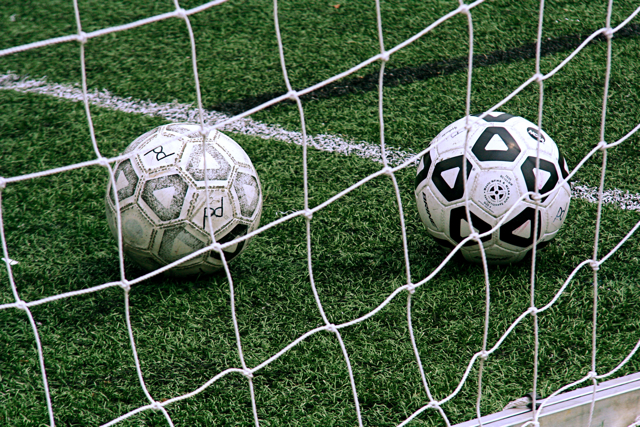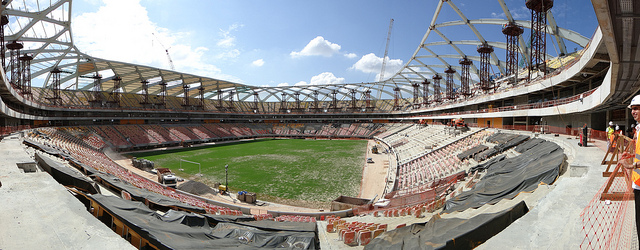By Fiona McPherson
The United States and Great Britain are two countries separated by a common language – a phrase commonly attributed to Shaw sometime in the 1940s, although apparently not to be found in any of his published works. Perhaps another way of looking at it is to say that they are two countries separated by a different ball – a sentiment that is particularly apt when football’s World Cup comes around.
Of course, it isn’t quite as simple as that. For years we’ve heard how football is becoming ever more popular in the USA. Major League Soccer’s profile continues to build, and indeed, the US even hosted the World Cup in 1994, and has twice won the FIFA Women’s World Cup. But despite this, football pales into insignificance compared with other big US sports. The National (American) Football League brought in 9 billion dollars in revenue in 2013, whereas Major League Soccer earned only about half a billion; even the National Hockey League earned over 3 billion. If you’re one of those Americans who hasn’t yet become a diehard fan, here’s a potted (and tongue) guide to bluffing your way into sounding knowledgeable about the beautiful game.

The first rule of football is…
…don’t call it soccer, certainly not within earshot of someone who thinks of it as ‘proper’ football. This is probably the most crucial element in giving the impression that you’ve been into this game for decades. Naturally this can be difficult if you are trying to differentiate between two different sports (in the UK it is easy – American football v football). Soccer, the word, comes from an abbreviation for Association (from Association Football, the ‘official’ name for the game) plus the addition of the suffix -er. This suffix (originally Rugby School slang, and then adopted by Oxford University), was appended to ‘shortened’ nouns, in order to form jocular words. Rugger is probably the most common example, but other examples included in the Oxford English Dictionary are brekker (for breakfast), bonner (for bonfire), and cupper (a series of intercollegiate matches played in competition for a cup).
Apart from its origins being decidedly British, you will find plenty of examples of soccer being used by British people over the decades. But in terms of the history of the language, it’s something of a 19th-century johnny-come-lately: by contrast, football has been used since the 1400s. In modern usage, in order to blend in with the diehard fans, it’s preferable to stick to football – and, when speaking to these fans, never, ever call it Association Football.
A quick reference to sound like a football native:
Match vs game
Match is used in relation to football, but game (used in American Football) is actually the older sense. Game, meaning a competitive activity governed by rules of play, is found in Old English – while match in a similar sense dates to the 16th century. (The word match is also found in Old English, with reference to spouses or people of equal standing.)
Pitch vs field
Pitch, meaning ‘the area of play in a field game’ and used in football, is quite a recent addition to English — currently first found in the late 19th century — and field (with a similar definition, used for American football) predates it by over 150 years. Yet fashions change, and you should refer to a football pitch if you want to be accepted by aficionados in Britain.
Boots vs cleats / shoes
The distinction between boots (used in football) and shoes (in American football) isn’t particularly noteworthy, but the use of cleats is more intriguing. It’s actually an example of synecdoche: the part is used to represent the whole. This becomes clear if you realize that cleats are the projections on the sole of a shoe, designed to prevent the wearer losing their footing (which are commonly called studs in British English).
Extra time vs overtime
As the name suggests, extra time is a further period of play in football, added on to a game if the scores are equal and the match must be decided (not to be confused with injury time, added to compensate for time lost dealing with injuries). Overtime describes the same event in North American games, drawing on the older sense of ‘time worked in addition to one’s normal working hours’. The first use of both terms is currently dated to the early 20th century, with extra time coming first.
To mark vs to guard vs to cover
Guarding in basketball, and marking in a variety of British games including football, means keeping close to an opponent in order to prevent them from getting or passing the ball. To add to the international confusion, in Australian Rules Football, marking a ball means catching it from a kick of at least ten metres and is to be celebrated – whereas, unless you’re the goalkeeper (or in the crowd), catching the ball at all in football is a handball and a foul. In American football, a defensive player will cover an offensive player.
Kit vs uniform
A uniform (worn for American sports) may sound more militaristic than a kit (worn in football), but the latter actually has fairly regimental (albeit more informal) origins – the sense comes from kit as the equipment of a solider (also known as articles of kit). This sense, in turn, relates to an earlier sense of kit as a container for carrying commodities – from the Dutch kitte, a wooden vessel made of hooped staves.
There’s no other way
In American Football, there are numerous ways to score. In football, there is only one. If the ball ends up in the back of the net (provided there has been no infringement of the rules), it’s a goal. Whether scored by a header, from the penalty spot, a volley, route one, scissor kick, after a glorious mazy run from one end of the pitch to the other, or even if it hits a defending player on the bottom/knee/shoulder and deflects past the goalkeeper into the goal, it’s just a goal, and only counts for one point.
0-0 can be exciting
It’s probably a bit of an urban myth that Americans bemoan the fact that it’s perfectly possible to sit through 90 minutes of football, and for the end result to be 0-0. Meaning that no one scored. While any self-respecting football fan will have witnessed the dourest of dour games which end up as a goalless draw, there are action-packed games which inexplicably end up goalless due to one or more goalies playing a blinder. You’ll just have to believe us on this. While you can’t immediately tell from the numbers written as symbols, that ‘0-0’ is nil-nil rather than zero-zero. A good way to expose your ignorance amongst football fans is to refer to a result being two-zero, as the 0 is always termed nil in football. Nil is a contraction of the Latin nihil, meaning ‘nothing’, and also to be found in the word nihilism (the belief that nothing in the world has a real existence).
And last, but not least, don’t worry too much about explaining the offside rule. Plenty of people can’t.
A version of this post first appeared on the OxfordWords blog.
Fiona McPherson is a Senior Editor with the Oxford English Dictionary.
Subscribe to the OUPblog via email or RSS.
Subscribe to only language articles on the OUPblog via email or RSS.
Image: Soccer Balls Net 7-22-09 1 by Steven Depolo. CC BY 2.0 via Flickr.
The post The first rule of football is… don’t call it soccer appeared first on OUPblog.



